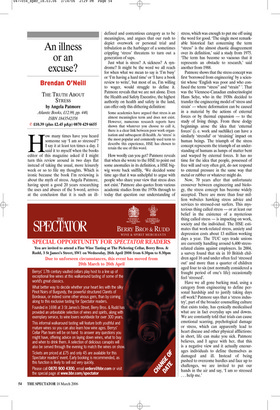An illness or an excuse?
Brendan O’Neill
THE TRUTH ABOUT STRESS by Angela Patmore Atlantic Books, £12.99, pp. 440, ISBN 1843542358 ✆ £10.39 (plus £2.45 p&p) 0870 429 6655 How many times have you heard someone say ‘I am so stressed’? I say it at least ten times a day. I said it to myself when the books editor of this magazine asked if I might turn this review around in two days flat instead of taking the usual, more leisurely week or so to file my thoughts. Which is ironic because the book I’m reviewing is about the myth of stress. Angela Patmore, having spent a good 20 years researching the uses and abuses of the S-word, arrives at the conclusion that it is such an ill defined and contentious category as to be meaningless, and argues that our rush to depict overwork or personal trial and tribulation as the harbinger of a sometimes crippling ‘stress’ threatens to turn out a generation of saps.
Just what is stress? A sickness? A syndrome? It might be the word we all reach for when what we mean to say is ‘I’m busy’ or ‘I’m having a hard time’ or ‘I have a book review to write’, but most of us, I’m willing to wager, would struggle to define it. Patmore reveals that we are not alone. Even the Health and Safety Executive, the highest authority on health and safety in the land, can offer only this dithering definition:
Some academics have argued that stress is an almost meaningless term and does not exist. However, numerous research reports have shown that whatever you choose to call it, there is a clear link between poor work organisation and subsequent ill-health. As ‘stress’ is the most popular and commonly used term to describe this experience, HSE has chosen to retain the use of this word.
How woolly can you get? Patmore reveals that when she wrote to the HSE to point out some anomalies in its definition, a HSE bigwig wrote back sniffily, ‘We decided some time ago that it was unhelpful to argue with people who share your view that stress does not exist.’ Patmore also quotes from various academic studies from the 1970s through to today that question our understanding of stress, which was enough to put me off using the word for good. ‘The single most remarkable historical fact concerning the term “stress” is the almost chaotic disagreement over its definition,’ said a study from 1975. ‘The term has become so vacuous that it represents an obstacle to research,’ said another from 1988.
Patmore shows that the stress concept was first ‘borrowed from engineering’ by a scientist whose ‘English was poor and who confused the terms “stress” and “strain” ’. That was the Viennese-Canadian endocrinologist Hans Selye, who in the 1930s decided to transfer the engineering model of ‘stress and strain’ — where deformation can be caused in a material by the actions of external forces or by thermal expansion — to the study of living things. From these dodgy beginnings arose the idea that ‘external forces’ (i. e. work and suchlike) can have a similarly ‘stressful’ or ‘straining’ impact on human beings. The triumph of the stress concept represents the triumph of an understanding of humans as lumps of matter bent and warped by external forces. It has no time for the idea that people, possessed of free will and very often grit, do not respond to external pressure in the same way that metal or rubber or whatever might do.
Now, 70 years after that unfortunate crossover between engineering and biology, the stress concept has become widely accepted. There are more than four million websites hawking stress advice and services to stressed-out surfers. This mysterious thing called stress — or at least our belief in the existence of a mysterious thing called stress — is impacting on work, society and the individual. The HSE estimates that work-related stress, anxiety and depression costs about 13 million working days a year. The TUC says trade unions are currently handling around 6,400 stressrelated claims against employers. In 2004, a survey found that six in 10 British children aged 16 and under often feel ‘stressed out’ and more than a quarter of children aged four to six (not normally considered a fraught period of one’s life) occasionally feel ‘stressed’.
Have we all gone barking mad, using a category from engineering to define personal hardship and to justify taking days off work? Patmore says that a ‘stress industry’, part of the broader counselling culture that exists today, has cynically medicalised what are in fact everyday ups and downs. We are constantly told that trials can cause emotional scarring, psychological damage or stress, which can apparently lead to heart disease and other physical afflictions: in short, life can make you sick. Patmore believes, and I agree with her, that this is a negative view and it actually encourages individuals to define themselves as damaged and ill. Instead of being pushed to overcome hurdles and face up to challenges, we are invited to put our hands in the air and say, ‘I am so stressed . . . help me.’


















































































 Previous page
Previous page